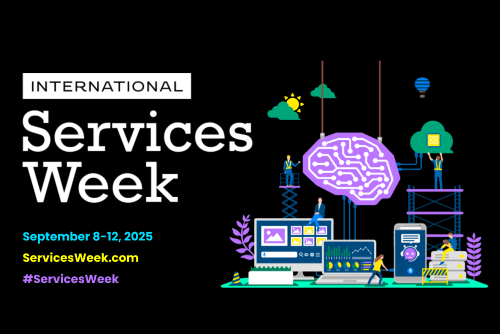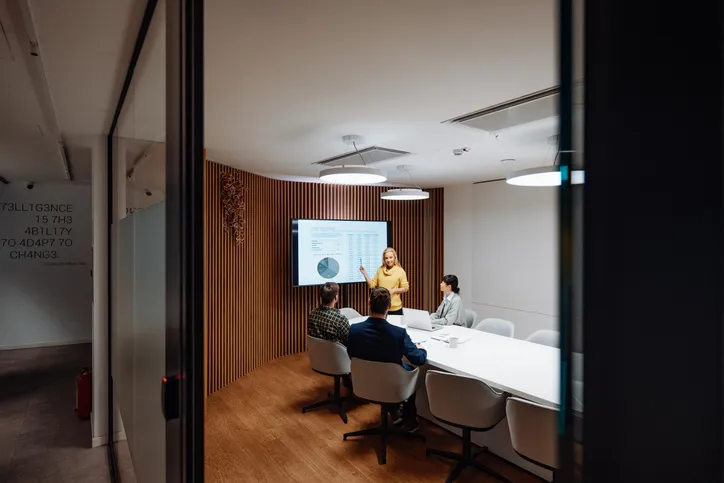Five key trends that will define professional services in 2024
- December 31
- 5 Minute Read

Professional services is an industry that’s comfortable with change and disruption. As any project manager will tell you, best laid plans rarely reflect the reality of project delivery.
But over the last few years, even the most stalwart PM would have to admit the pace and intensity of disruption has reached dizzying new heights. Supply chain chaos, the rise of hybrid working and multiple lockdowns are just a few examples of changes that have redefined the way we do business.
We’re still dealing with many of these trends today. In fact, 2024 is likely to be a year of further disruption. AI will continue to seep into our everyday lives, the economy may (or may not) stabilise, and political upheaval will continue to resonate across global markets.
Now, more than ever, professional service providers must prioritise operational resilience – the art of sustaining critical functions and assets during disruption.
But how will they do this? Here are our top five predictions.
1. Forecasting to the fore
During times of uncertainty, one thing will help professional services providers stand out – predictability. If your business can honour timelines and cost estimates then you’re far more likely to retain clients over the long term.
With this in mind, we believe forecasting will be a key trend in 2024. In an effort to gain a clear and accurate understanding of their capabilities, professional services providers will invest in the tools they need to build an end-to-end view of operations, moving from just understanding revenue forecasts, to a new paradigm. This means being able to plan and match capacity, skills and capabilities with anticipated demand, and forecasting their cash position around costs, revenues and margins with far greater accuracy. Businesses will break down silos to unite every customer-facing function – sales, service, and success – and ensure everyone is singing from the same songbook.
2. Pragmatic AI gains prominence
Artificial Intelligence may be overhyped, but it does have potential opportunities for professional service teams. Rather than flashy vanity projects, professional services companies should focus on Pragmatic AI – a practice that targets real-world, current business problems for enterprises, such as improving specific key metrics like CSAT, NPS, and gross or project margin.
In 2024, we believe that Pragmatic AI will proliferate across the business landscape with services teams running tightly-scoped proof-of-concept initiatives to evaluate and measure the value of AI solutions. And as effective AI depends on clean data and tight governance, we’re likely to see more businesses embrace data quality programs and practices.
3. Customer success is redefined
Customer experience used to be a top three c-suite priority, but over the last few years it has been pushed down the list in favour of cost reduction and operational excellence.
Right now, many providers are focused on delivery at the expense of customer success and service. In professional services, this trend will start to change in 2024 with a renewed focus on the long tail of projects. Next year, solution optimisation will be the order of the day as providers look to retain customers and win repeat business
Certinia is already leading the charge with a game-changing solution called Customer Success Cloud. By providing a complete, customer-centric view of an entire organisation, this allows everyone involved in customer success to drill down into the revenue opportunities associated with each customer, and take a proactive approach to building exceptional customer relationships.
4. EX unlocks new CX gains
Employee experience is inherently linked to customer experience. When employees feel their needs are being met, with the tools to do their jobs as effectively as possible, then they’re more likely to perform to the highest possible standard. It also means sharing information with colleagues and customers as a united, focused team.
Next year, professional services providers will seek to capitalise on this connection. Many of our customers are already doing this by giving their employees more say on the types of projects they work on, and empowering them with more understanding of their personal development opportunities and how work can support their individual aspirations. Employees can explore new skills, work in new focus areas and experiment with new technologies such as generative AI, as part of their career growth. The results are impressive. Employee satisfaction scores improve, as do retention rates. And of course, there’s a knock-on effect on the customer relationship, reflected in increased sales and revenue.
5. The acquisition makeover
High interest rates have impacted the IPO market and many business leaders are now reconsidering acquisition as an exit strategy. This trend is likely to continue into 2024, prompting professional services providers to undertake some form of acquisition makeover. This may involve cutting costs, optimising utilisation and expanding margins, but the ultimate goal will be the same: making the business more attractive to the market.
It will be interesting to see how technology influences decision making. In our experience, successful acquisitions depend on complementary tech stacks. Growing businesses need to be resilient and prepared to scale in size and complexity, taking on more customers, new services and new business models, which requires a robust yet flexible platform to underpin the company. Plus, any investor doing their due diligence will take a view of the technology environment that underpins the business, from the perspective of business risk. They need to know that they can get reliable, accurate information rapidly from the business, in order to make critical business decisions.
Want to discuss how these trends could impact your organisation in the near future, and how Certinia can help you navigate them? Reach out to us.
Recent Articles
Maximize your Salesforce investment with Certinia






